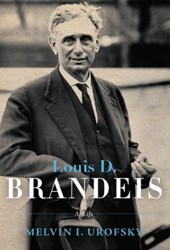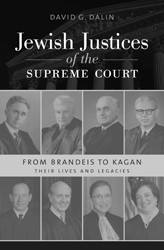Idealistic, deeply ethical, and committed to unflinching moral standards, Louis D. Brandeis — “Old Isaiah” to President Franklin Roosevelt — had a vision of democracy practiced at its highest level that drew, according to National Constitution Center director Jeffrey Rosen, on Brandeis’s interest in ancient Greek history and the thinking of Thomas Jefferson. To commemorate the hundredth anniversary of Brandeis’s confirmation as a Supreme Court justice, Rosen offers an intellectual biography that demonstrates Brandeis’s foresight in explicating issues that are still at the heart of political and constitutional debate.
Early in his career, Brandeis emerged as a champion of the working man and small business owner. In his home state of Massachusetts, he fought against the entrenched corruption of public utilities and life insurance companies and backed legislation that benefited workers. He argued against corporate capitalism and consolidation, warning that a financial oligarchy — symbolized by J. P. Morgan and other investment bankers — threatened both the United States economy and democracy itself. As an economic advisor to Woodrow Wilson, Brandeis helped shape the administration’s policy toward monopolies, notably the Clayton Antitrust Act, the Federal Trade Commission, and the Federal Reserve. His influence can be seen, too, in the Banking Act of 1933, generally called the Glass-Steagall Act. Brandeis also opposed big government, rejecting, with the rest of the Court, Franklin Roosevelt’s early New Deal initiatives, and favored judicial restraint, expressing his trust in the federal system in a 1932 dissent that advocated for states’ experimentation in social and economic issues.
Whitney v. California (1927), a landmark defense of freedom of speech and thought, sums up Brandeis’s deeply held conviction that informed debate led to informed decisions: “the greatest menace to freedom is an inert people.” Brandeis also laid the foundation for the right to privacy in a Harvard Law Review article written with his law partner, Samuel Warren, prompted by photographers who “invaded the sacred precincts of private and domestic life.” In arguing a case before the Supreme Court in 1908, Brandeis based his brief not on legal abstractions but on lengthy investigation into the social and scientific facts of the case. An innovative approach, the Brandeis brief is now a model for judicial argument.
A secular Jew, Brandeis came to the leadership of the American Zionist movement in his fifties. Introduced to Zionism by Theodor Herzl’s American secretary, Jacob de Haas, Brandeis began an intensive study of the movement. Convinced of its goals, he successfully organized and raised funds, promoting the American Zionist cause and pressing Wilson to accept the Balfour Declaration. In the years that followed, Brandeis maintained his efforts, intensified by rising antisemitism in Europe, with both President Hoover and President Roosevelt.
In Brandeis’s long and multifaceted career as activist lawyer, Supreme Court justice, and American Zionist, Rosen underscores Brandeis’s lifelong passion for and dedication to social justice, freedom of thought and speech, and an informed citizenry. Brandeis’s faith in self-education and informed decisions may seem overly optimistic in the face of today’s corporate power and polarized media and some of his opinions are open to question, but his unwavering quest for justice and open exchange of information should remind readers of their responsibility in a democracy. Rosen gives readers the opportunity to absorb Brandeis’s breadth of interests and intellect and to encourage their own action.
Related Content:
Maron L. Waxman, retired editorial director, special projects, at the American Museum of Natural History, was also an editorial director at HarperCollins and Book-of-the-Month Club.





